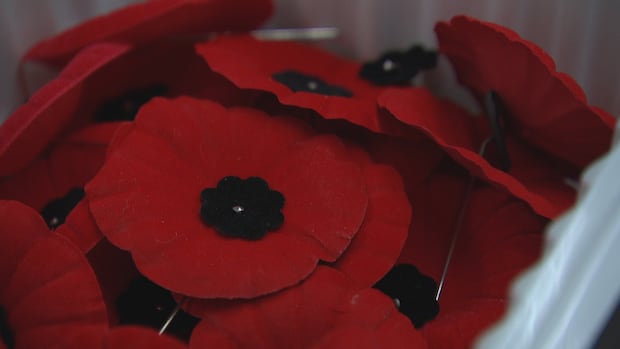N.B. military history stitched in red on 110-year-old quilt
More than 650 people signed the 42-block quilt, says Melynda Jarratt, curator of military museum

The New Brunswick Military History Museum is in possession of a unique piece of history that was once used to raise money for front-line soldiers.
It's a 110-year-old quilt top, embroidered with hundreds of names.
Melynda Jarratt, curator of the museum, said the quilt was won in a draw by someone named Lettie Seely.
It was a fundraiser for First World War soldiers, and more than 650 people paid a dollar to sign one of the 42 blocks.
"We're finding patterns in the names, which is so fascinating," said Jarratt.

Museum manager David Hughes said based on the date on the quilt, it seems it was completed on Nov. 11, 1914, when the war was in its infancy.
The Nov. 11 date is what Hughes calls an "unusual happenstance," since that date didn't become Remembrance Day until four years after the quilt was done.
He said the quilt is quite fragile, as it is just the top panel of fabric and it's more than 100 years old. They do plan to have it finished.
People would have paid to sign the quilt within one of the stars on each square, he said, and then the ladies who produced it, the Girls Sewing Circle, embroidered over the top of each signature by hand.

Generally, Hughes said, women's groups would use the funds to buy items to send overseas to the soldiers.
"Extra socks, sometimes chocolate, sometimes cigarettes, just some comforts of home," he said.

The museum has had the quilt on display during Remembrance Week, and Hughes said his hope was that people would be able to make a visible, physical connection with their ancestors who were alive during that war.
Jarratt said there are many surnames on the quilt that would be familiar to New Brunswickers, such as Morehouse, Saunders and Boone.
"I'm expecting that we're going to get heightened interest from the genealogy groups," she said.
"I see this being a very large project that could take on a life of its own.
"I bet you there's more to this signature quilt than meets the eye. I can hardly wait to uncover the deep mysteries that are buried deep within each one of those signatures."
With files from Shift, Clare MacKenzie

